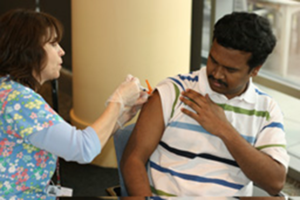By Ashley Bradley/ne news editor

Corban La Fon/The Collegian
People are still dying from the H1N1 disease. In January, after two people died in Tarrant County, the overall number of county H1N1 deaths reached 13.
Tarrant County Public Health said the best way to prevent the flu is by getting vaccinated.
Public Health visited NW Campus in December and TR and South campuses last week to administer vaccines and will visit SE Campus noon-5 p.m. March 8 in the North Ballroom and NE Campus noon-5 p.m. March 10 in NSTU 1506A.
Marc Flake, public health officer for Tarrant County, said people should still be interested in getting the shot even though it’s not talked about as much.
“It’s still out there, and the shots are free,” he said. “The only real protection from the virus is by getting this vaccine. You can wash your hands and do all other kinds of hygiene things, but the vaccine is the only real way.”
Flake said H1N1 should still scare people.
“It raised its ugly head for the first time last April,” he said. “Now, H1N1 is the most predominant flu.”
He said 500 doses are being sent to each campus, but more than 50,000 doses are available to all of Tarrant County, so there is little chance of running out.
NE student Edgar Contreras said he was concerned about getting the vaccine last fall because the disease spread so fast.
“At that time, I was interested in getting the vaccine because every one was worried about it,” he said.
Contreras didn’t realize people were still contracting the disease and said he now wants to take advantage of the free shots.
“If people are dying still, I need to be worried about it,” he said. “If it’s free, I’ll for sure get it.”
Student Alanna Black disagreed. Her aunt works in an emergency room and saw bad side effects from the vaccine, Black said.
“The side effects’ risks are greater than the positive effects of the vaccine,” she said. “The vaccine came out too fast. My family is seeing adverse effects.”
Flake said he hasn’t heard of any of any negative effects of the vaccine.
“We’ve had no reported side effects. I haven’t heard of anyone having a reaction to this other than a sore arm,” he said, regarding the shot. “Back in 1976, they had a swine flu vaccine that had some problems, but it’s not the same vaccine.”
College students normally think the flu doesn’t affect them. The common idea is that it affects only older individuals and children.
“The strange thing is it attacks the younger population the most,” said health sciences director Woody Kaegler. “H1N1 has been circulating in the younger populations and, once you get this shot, you should be immune to this strain.”
Doctors annually put out a different flu vaccine, depending on the type of strain.
“Every year, the flu creates a different strain,” Kaegler said. “Doctors always have to predict what the seasonal flu would look like.”
The Public Health Web site lists six ways to prevent the flu: keeping hands clean; covering the mouth when coughing and sneezing; avoiding touching eyes, nose and mouth; avoiding close contact with others; staying at home when sick; and getting vaccinated.
Flake said students should especially take advantage of the free shots because spring break is around the corner.
“If they are going somewhere on spring break where the virus is present, it’s a good idea to get it now,” he said.
Flake said Public Health has just created a Facebook page, and he encourages people to see it, ask questions and comment on things they have going on.
“I have a 20-year-old helping me with it [Facebook]. She knows what’s going on better than me,” he said.
For additional information, search for the Public Health page on Facebook or contact campus health services departments.




















